Fortress Lutheran Library Expansion Bundle (30 vols.)
Digital Logos Edition
Overview
Add 30 key Lutheran titles to your library, covering a wide range of topics, including theology, church history, ministry, spirituality, and more. You’ll get scholarly studies of founding and modern Lutheran theologians, primary texts from Martin Luther and Dietrich Bonhoeffer, as well as treatments of timely theological issues by distinguished contemporary Lutheran theologians. Expand your study of the Lutheran tradition with these indispensable resources from the world's leading experts.
Get more than 50 volumes of Luther’s Works (55 vols.) for a fraction of their print price.

Key Features
- Features new and classic works on Lutheran theology, history, liturgy, and biblical interpretation
- Includes the celebrated Annotated Luther series, biographies, and collected works of several Lutheran theologians
- Covers key concepts in Lutheran thought as well as works on practical application
- Provides a well-rounded collection of classic and contemporary works on Lutheranism
Product Details
- Title: Fortress Lutheran Library Expansion Bundle
- Publisher: Fortress
- Volumes: 30
- Pages: 11,205
- Christian Group: Lutheran
Individual Titles
- Christian Dogmatics, Volume 1 edited by Carl E. Braaten and Robert W. Jenson
- Christian Dogmatics, Volume 2 edited by Carl E. Braaten and Robert W. Jenson
- Lutherans in America: A New History by Mark Granquist
- Documents from the History of Lutheranism, 1517–1750 edited by Eric Lund
- Fortress Introduction to Lutheranism by Eric W. Gritsch
- Fruit for the Soul: Luther on the Lament Psalms by Dennis Ngien
- God's Word for Today: A Daily Devotional for the Whole Year by O. Hallesby
- The Law-Gospel Debate: An Interpretation of Its Historical Development by Gerhard O. Forde
- Theology is for Proclamation by Gerhard O. Forde
- Where God Meets Man: Luther's Down-to-Earth Approach to the Gospel by Gerhard O. Forde
- The Lutheran Handbook: A Field Guide to Church Stuff, Everyday Stuff, and the Bible by Kristofer Skrade
- The Lutheran Handbook II by Kristofer Skrade
- The Lutheran Handbook on Marriage by Kristofer Skrade
- Lutheranism: The Theological Movement and Its Confessional Writings by Robert W. Jensen and Eric W. Gritsch
- Lutheran Questions, Lutheran Answers: Exploring Christian Faith by Martin E. Marty
- Toxic Spirituality: Four Enduring Temptations of Christian Faith by Eric W. Gritsch
- Martin Luther: His Road to Reformation 1483-1521 by Martin Brecht
- Martin Luther 1521-1532: Shaping and Defining the Reformation by by Martin Brecht
- Martin Luther: The Preservation of the Church 1532-1546 by by Martin Brecht
- Atlas of the European Reformations by Tim Dowley
- The Bonhoeffer Reader by Dietrich Bonhoeffer
- The Cross of Reality: Luther's Theologia Crucis and Bonhoeffer's Christology by H. Gaylon Barker
- Engaging Bonhoeffer: The Impact and Influence of Bonhoeffer’s Life and Thought edited by Matthew D. Kirkpatrick
- Martin Luther and the Called Life by Mark D. Tranvik
- Sin Boldly! Justifying Faith for Fragile and Broken Souls by Ted Peters
- The Annotated Luther, Volume 1: The Roots of Reform edited by Timothy J. Wengert
- The Annotated Luther, Volume 2: Word and Faith edited by Kirsi I. Stjerna
- The Annotated Luther, Volume 3: Church and Sacraments edited by Paul W. Robinson
- The Annotated Luther, Volume 4: Pastoral Writings edited by Mary Jane Haemig
- The Honeycomb Scroll: Phillip Melancthon at the Dawn of the Reformation by Gregory B. Graybill
This title is included in the following collections
You can save when you purchase this product as part of a collection.
2025 Lutheran Diamond
$2,999.99$2,249.992025 Lutheran Portfolio
$4,749.99$3,562.49Logos 8 Lutheran Portfolio Leg...
$4,749.99$4,749.99Logos 9 Lutheran Portfolio Leg...
$4,749.99$4,749.99
- $11,399.99
- $23,999.99$17,999.99
- $21,749.99
- $24,999.99
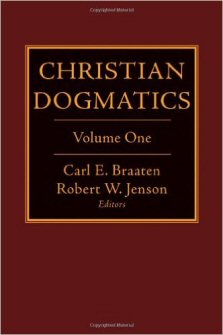
Christian Dogmatics is a two-volume survey of the twelve major loci of Christian doctrine, each treated extensively in terms of its biblical foundations, historical tradition, and contemporary significance. From the perspective of the Lutheran tradition and in view of the unique questions and issues of the American context, each locus is developed independent of the others by six theologians, themselves influenced by divergent theological movements. Contributors include Carl Braaten, Gerhard Forde, Philip Hefner, Robert Jenson, Paul Sponheim, and Hans Schwartz. Volume 1 discusses dogmatics, the Trinity, the identity of God, creation, sin, and Christology.
Robert W. Jenson is the former senior scholar for research at the Center of Theological Inquiry in Princeton, New Jersey, and professor emeritus of religion at Saint Olaf College, Northfield, Minnesota. He also spent two decades teaching at Lutheran Theological Seminary in Gettysburg. With Carl Braaten, Jenson founded the Center for Catholic and Evangelical Theology and co-edited the journal Pro Ecclesia.
Carl E. Braaten is a leading theologian in American Lutheranism. He taught Systematic Theology for a generation at Lutheran School of Theology at Chicago and together with Rober W. Jenson founded the Center for Catholic and Evangelical Theology and co-edited the journal Pro Ecclesia.
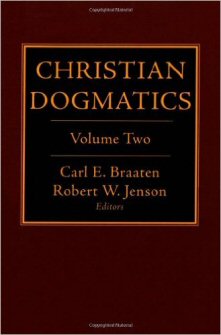
Christian Dogmatics is a two-volume survey of the twelve major loci of Christian doctrine, each treated extensively in terms of its biblical foundations, historical tradition, and contemporary significance. From the perspective of the Lutheran tradition and in view of the unique questions and issues of the American context, each locus is developed independent of the others by six theologians, themselves influenced by divergent theological movements. Contributors include Carl Braaten, Gerhard Forde, Philip Hefner, Robert Jenson, Paul Sponheim, and Hans Schwartz. Volume 2 treats atonement, the Holy Spirit, ecclesiology, the sacraments, justification by faith, and eschatology.
Robert W. Jenson is the former senior scholar for research at the Center of Theological Inquiry in Princeton, New Jersey, and professor emeritus of religion at Saint Olaf College, Northfield, Minnesota. He also spent two decades teaching at Lutheran Theological Seminary in Gettysburg. With Carl Braaten, Jenson founded the Center for Catholic and Evangelical Theology and co-edited the journal Pro Ecclesia.
Carl E. Braaten is a leading theologian in American Lutheranism. He taught Systematic Theology for a generation at Lutheran School of Theology at Chicago and together with Rober W. Jenson founded the Center for Catholic and Evangelical Theology and co-edited the journal Pro Ecclesia.
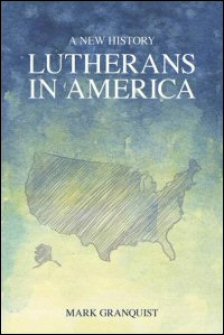
The story of Lutherans in America is one of mutual influence. From the first small groups of Lutherans to arrive in the colonies, to the large immigrations to the rich heartland of a growing nation, Lutherans have influenced, and been influenced by, America.
In this lively and engaging new history, Granquist brings to light not only the varied and fascinating institutions that Lutherans founded and sustained but the people that lived within them. The result is a generous, human history that tells a complete story—not only about politics and policies but also the piety and the practical experiences of the Lutheran men and women who lived and worked in the American context.
Bringing the story all the way to the present day and complemented with new charts, maps, images, and sidebars, Granquist ably covers the full range of Lutheran expressions, bringing order and clarity to a complex and vibrant tradition.
An immensely interesting, comprehensive, and necessary update of American Lutheran history. A good deal of its interesting quality has to do with Granquist’s new interpretative lens—more sober and critical than earlier histories—and with his inclusion of an excursus after each chapter dealing with the ordinary, daily lives of Lutherans in the period under discussion.
—Robert Benne, emeritus professor, Roanoke College
Mark Granquist is associate professor of church history at Luther Seminary in St. Paul, Minnesota. Previously, he taught at St. Olaf College (1992–2000) and Gustavus Adolphus College (2000–2007). Among other books, he is the author, with Maria Erling, of The Augustana Story: Shaping Lutheran Identity in North America.
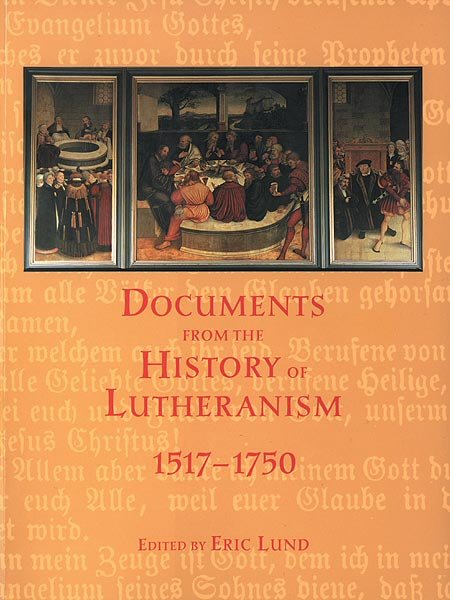
This unique collection of excerpts from Lutheran historical and theological documents — many translated here for the first time — presents readers with a full picture of how the Lutheran movement developed in its thought and practice. The volume proceeds chronologically from Luther's lifetime to the beginnings of the Enlightenment. Each chapter begins with a summary essay and proceeds thematically.
Covering not only theology but also church life, popular piety, and influential historical events, the more than 200 primary documents excerpted here show not only the evolution and development of Lutheran doctrine but also its devotional writings, hymns, liturgical texts, letters and diaries, satire, political documents, woodcuts, and pamphlet literature. Lund's judicious selection, careful translation, and helpful introductions acquaint readers with the turbulence and fervor of this revolutionary Christian movement, its struggles for survival and consolidation, its flowering in the age of orthodoxy and pietism, always with an eye to how it affected and was experienced by ordinary people.
Eric Lund is professor of the history of Christianity at St. Olaf College, Northfield, Minnesota, where he has taught for twenty years. His publications have concerned Reformation, the history of spirituality, and William Tyndale.
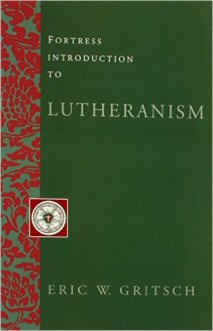
A helpful and accessible guide to Lutheranism's history and central tenents, with numerous photos and illustrations.
Small wonder that many are confused about Lutheranism's historical origins, doctrinal affirmation, and ethical directives. Even Lutherans themselvesmaintains, Eric Gritsch, a leading authority on the Lutheran traditionare not clear about their identity. Some Lutheran consider themselves heirs to a reform movement, others see themselves as members of a denomination or ecclesial institution, and still others are confounded by the tension and miss the tradition's thrust.
Fortress Introduction to Lutheranism offers in Part One a concise, well-written overview of this group's history from The Book of Concord to the present and in Part Two a distillation of its teachings as challenges to the reader.
Eric W. Gritsch is the former senior scholar for research at the Center of Theological Inquiry in Princeton, New Jersey, and professor emeritus of religion at Saint Olaf College, Northfield, Minnesota. He also spent two decades teaching at Lutheran Theological Seminary in Gettysburg. With Carl Braaten, Jenson founded the Center for Catholic and Evangelical Theology and co-edited the journal Pro Ecclesia
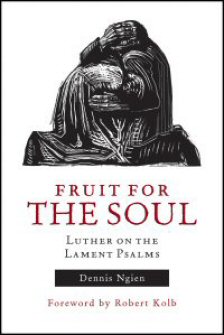
Given a life spent in scholarship and controversy, it is easy to forget how much energy Martin Luther devoted to helping the common person understand and take comfort from God’s word. This commitment extended to even the most challenging of biblical texts, and nowhere is this more apparent than Luther’s work on the lament psalms. Difficult to understand, and perhaps even more difficult to implement in life and devotion, the lament psalms played a key role in Luther’s thought. More importantly, the lament psalms were for Luther an essential part of the Christian’s understanding of the life of faith.
In this volume, Dennis Ngien helps contemporary readers engage Luther’s commentary on the lament psalms. What Luther intended for the education and encouragement of everyday Christians, Ngien unpacks and illuminates for life in the twenty-first century.
Dennis Ngien is professor of systematic theology at Tyndale University College and Seminary and research professor of theology at Wycliffe College, University of Toronto. He is the author of several books, including Gifted Response, and Luther as a Spiritual Adviser.
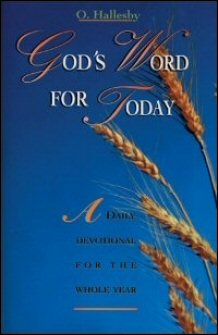
Here are classic devotions, based on the Bible, for everyday of the year, with ten devotions for special days and church festivals. Each mediation brings the light of God’s Word to our lives today.
This book, written in the deceptively simple language of distilled wisdom, is a classic for any individual or family who wants to begin or end the day listening to the heavenly Father’s voice.
—Ingrid Trobisch, author, The Confident Woman
O. Hallesby was one of Norway‘s leading Christian teachers and devotional writers. He played a leading role in the church’s opposition to the Nazis and was confined to a concentration camp for two years. Hiw writings, coming from a mind and heart attuned to God, continue to speak to Christians today.
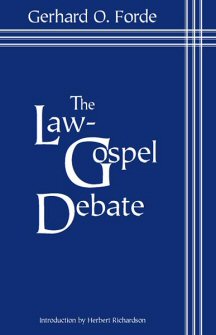
In this early work from “one of the defining theologians of American Lutheranism,” Gerhard O. Forde provides a superlative interpretation of more than 150 years of modern law-gospel debate. In presenting this history, he examines the positions of such outstanding theologians as J.C.K. von Hofmann (the "father of Heilsgeschichte"), Theodosius Harnack, Albrecht Ritschl, Karl Barth, Werner Elert, Helmut Thielicke, Gustaf Wingren, and Hans Iwand, before offering his own proposal for an understanding of the gospel as God's final word which "breaks the continuity of the law." Contemporary students of the law-gospel dialectic will find here a wealth of critical background, as well as the groundwork for Forde's mature thinking on the work of Christ, gospel, law, and eschatology.
Professor Forde analyzes the stimulating discussion that has been going on among theologians during the last century and a half. His selection of representatives is excellent, his exposition of their thought is lucid, and his criticism of their contentions is discerning. . . . Although the debate about law and gospel cannot be said to have ended, nobody can read this book without coming to a new appreciation of the tremendous importance of the issue not only for hermeneutics and dogmatics but also for social ethics and preaching.
—Theodore G. Tappert, Lutheran Quarterly
Gerhard O. Forde (1927–2005) was professor emeritus of systematic theology at Luther Seminary, St. Paul, Minnesota. His other books include On Being a Theologian of the Cross: Reflections on Luther's Heidelberg Disputation, 1518.
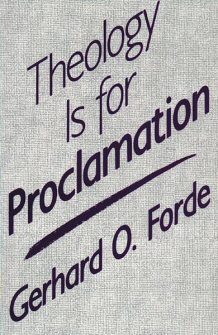
Drawing on Luther‘s Bondage of the Will, distinguished Lutheran theologian Gerhard Forde develops a systematic theology that places God's Word at the center and reinvigorates a ”theology of the cross” as core methodology for the church's kerygmaof the gospel.
Gerhard Forde makes a dashingly bold move to construct a whole systematic theology on the model of Martin Luther's Bondage of the Will. Forde continues Luther's polemic against every theology that fools with God apart from the Word. . . Forde writes a theology that is good for nothing but proclaiming the living Word of God.
—Carl E. Braaten, professor of systematic theology, Lutheran School of Theology at Chicago
Gerhard O. Forde (1927–2005) was professor emeritus of systematic theology at Luther Seminary, St. Paul, Minnesota. His other books include On Being a Theologian of the Cross: Reflections on Luther's Heidelberg Disputation, 1518.
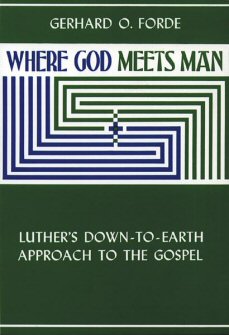
This book about Luther's theology is written out of a two-fold conviction. First, that many of our problems have arisen because we have not really understood our own traditions, especially in the case of Luther; and second, that there is still a lot of help for us in someone like Luther if we take the trouble to probe beneath the surface. It is an attempt to interpret Luther's theology for our own day.
The fundamental theme of the book is the "down-to-earth" character of Luther's theology. In using this theme, Forde points out that we have failed to understand the basic thrust or direction of Luther's theology and that this failure has caused and is still causing us grief. Modern scholarship has demonstrated that Luther simply did not share the views on the nature of faith and salvation that subsequent generations have foisted upon him and used to interpret his thinking. This book attempts to bring the results of some of that scholarship to light and make it more accessible to those who are searching for answers today.
The central questions of Christianity are examined in this fresh restatement of Luther's thought—the God-man relationship, the cross, the sacraments, this world and the next, and the role of the church. The author presents the "down-to-earth" character of Luther's theology in the hope that it will help individual Christians today to be both faithful to God and true to their human and social responsibilities.
Gerhard O. Forde (1927–2005) was professor emeritus of systematic theology at Luther Seminary, St. Paul, Minnesota. His other books include On Being a Theologian of the Cross: Reflections on Luther's Heidelberg Disputation, 1518.
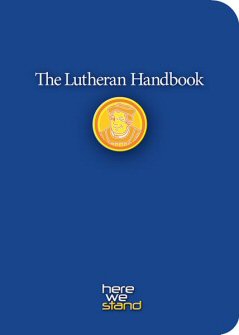
This book is an essential field guide for all things Lutheran. Confirmands—or anyone hiking the trails of life's adventures and challenges—will want to pack this handy illustrated field guide to Lutheran theology and culture. This enjoyable, easy-to-read, reliable, all-in-one collection helps you understand the essential information about our theology, culture and Lutheran way of life. It is organized by Church Stuff, Everyday Stuff and Bible Stuff with how-to's like How to Forgive Someone and lists like The Top-10 Bible Villains. It encapsulates essential principles of the Christian life, making many of the complexities of our religious tradition accessible for contemporary seekers.
This is a fun book that affirms that Lutherans can (and must!) continue to laugh at themselves! It takes God very seriously but helps the reader to 'lighten-up!' It reminds me of the quote, 'Laughter is another way of crossing ourselves!' From the picture of Luther on the cover (is this his confirmation photo?) to the final pages of 'tongue in check' humor, these pages are a great mix of what life is all about—hurts and hoorays, Good Fridays and Easters, life and death, praying and playing! The only addition I would have made is to have each page contain a 'caution flag' that would state either, 'I'm serious' or 'I'm kidding!' to assist the reader to know how to react! I know many Lutherans who will spend an inordinate amount of time thinking whether or not they should laugh, cry, pray, or scratch their heads...and certainly look around to see if anyone else is looking before they respond accordingly! I commend the editors and Augsburg for taking the Lord seriously enough to allow the Lord's followers to 'lighten-up' in the Lord of Laughter and Life! Let's continue to 'Pray, Play...and Give Thanks!
—Dr. Rich Bimler, president, Wheat Ridge Ministries
Kristofer Skrade is the new brand development editor at Augsburg Fortress Press. He has led a team of contributors and proofreaders in the creation of the Handbook Series. Previously, Skrade has pastored congregations in Seattle and St. Paul..
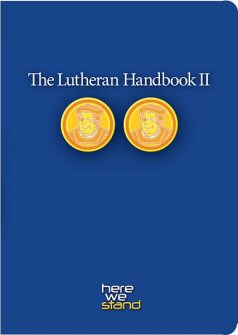
Being a good Lutheran is twice as hard in today's world. That's why every good Lutheran needs the power of The Lutheran Handbook II. With twice the Lutheran doctrine of its predecessor (and twice the humor!), this handbook will guide you through the most difficult theological terrain with ease. Never feel like you don't know enough Lutheran theology to accept a church council position or lead a Bible study! The Lutheran Handbook II puts it all at your fingertips, with clear, concise helps on: The Lutheran Reformers‘ Five Most Dastardly Theological Opponents, A Brief History of the Lutheran Movement, How To Usher, How To Tell if Your Will is in Bondage To Sin and What To Do About It, The Five Most Common Heresies Well-Intentioned Lutherans Commit, How To Tell the Difference Between a Vocation and a Vacation, How To Interpret Controversial Bible Passages and Remain Lutheran, and dozens of other essential tips for 21st-century Lutherans.
Kristofer Skrade is the new brand development editor at Augsburg Fortress Press. He has led a team of contributors and proofreaders in the creation of the Handbook Series. Previously, Skrade has pastored congregations in Seattle and St. Paul.
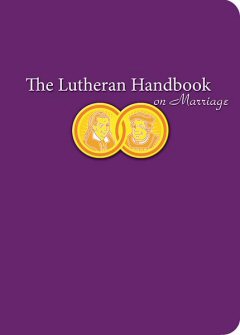
Great for engaged couples, newlyweds, and married couples going on their fiftieth year together, The Lutheran Handbook on Marriage brings wit and wisdom to the sometimes frustrating, but gracious gift of marriage.
Kristofer Skrade is the new brand development editor at Augsburg Fortress Press. He has led a team of contributors and proofreaders in the creation of the Handbook Series. Previously, Skrade has pastored congregations in Seattle and St. Paul.
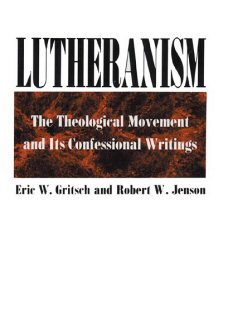
This useful guide offers a critical appraisal of a theological movement within the church catholic. The authors, a church historian and a systematic theologian, describe Lutheranism as centered in the fundamental principle of the Reformation, "justification by faith apart from works of law."
The book focuses on the emergence of this chief article of faith as a proposal of dogma to the church ecumenical, its theological formulation, and its significance for the shaping of piety and doctrine. Each issue is treated in terms of both confessional history and systematic theology. Seminarians, pastors, teachers, and interested laypersons of all traditions will gain ecumenical insights as well as pertinent information from this work.
Robert W. Jensen is a leading theologian in American Lutheranism. He taught systematic theology for a generation at Lutheran School of Theology at Chicago and together with Rober W. Jenson founded the Center for Catholic and Evangelical Theology and co-edited the journal Pro Ecclesia.
Eric W. Gritsch is the former senior scholar for research at the Center of Theological Inquiry in Princeton, New Jersey, and professor emeritus of religion at Saint Olaf College, Northfield, Minnesota. He also spent two decades teaching at Lutheran Theological Seminary in Gettysburg. With Carl Braaten, Jenson founded the Center for Catholic and Evangelical Theology and co-edited the journal Pro Ecclesia
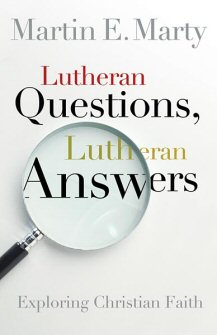
Lutherans often have questions about Lutheran theology and beliefs that are basic to the Christian faith itself. Featuring a unique question-and-answer format, Lutheran Questions, Lutheran Answers is an accessible and concise treatment that provides the most frequently asked questions on important topics and brief but complete answers from a distinguished Lutheran historian and theologian.
Martin E. Marty is the Fairfax M. Cone Distinguished Service Professor Emeritus at the University of Chicago, where he taught chiefly in the Divinity School for thirty-five years. He has published many books with Augsburg Books and Fortress Press including A Short History of Christianity, The Lord's Supper, Faith, Speaking of Trust, and with his son, Micah Marty, Places Along the Way and Our Hope for Years to Come. He lives in Chicago.

G.K. Chesterton long ago observed that real Christianity had in some ways never really been tried. Eric Gritsch, a renowned historian, a pastor, and a theologian for half a century, offers Christianity a reality check, exposing four historical movements that have weakened and abused the core of the Christian tradition. These movements represent wayward views on the relationships between Christians and Jews; between the authority of Scripture and tradition; between the church and worldy power; and between faith and morals. Readers encounter these wayward traditions in their historical trajectories, in the ways these traditions have diminished the gospel, and in the ways they have been impediments of an effective contemporary Christian witness. They represent the enduring temptation to be "like God" (Gen. 3:5), a temptation marked by a zeal for secure, unchanging, and ultimate Christian life on Earth. The author confronts these wayward traditions with the enduring challenge of faithful, cruciform, penultimate discipleship in the time between the first and second advent of Christ.
This book offers a searching diagnosis of teh perennial dangers that prejudice, ignorance, violence, and fear have posed to teh Christian tradition and a robust call for the church and its members to excorcise the idols of anti-semitism, fundamentalism, triumphalism, and moralism. This book will shake you and inspire you.
—John Witte Jr., professor of law and director of the Center for the Study of Law and Reigion, Emory law School
Eric W. Gritsch is the former senior scholar for research at the Center of Theological Inquiry in Princeton, New Jersey, and professor emeritus of religion at Saint Olaf College, Northfield, Minnesota. He also spent two decades teaching at Lutheran Theological Seminary in Gettysburg. With Carl Braaten, Jenson founded the Center for Catholic and Evangelical Theology and co-edited the journal Pro Ecclesia
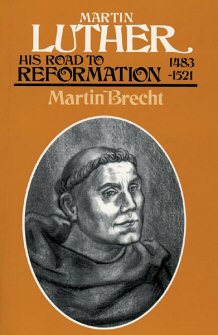
This first volume in Martin Brecht's three-volume biography recounts Luther's youth and young adulthood up to the period of the Diet of Worms. Brecht, in a clear, eloquent translation by James Schaaf, discusses Luther's education at the University of Erfurt, his monastic life, his canonical trial in 1519, the Leipzig debate, and his earliest contributions to the beginning of the Reformation.
Brecht's scholarship is impeccable and his book is indeed original. He displays a remarkable talent for precision and conciseness of statement.
—David W. Lotz, Washburn Professor of Church History, Union Theological Seminary
Martin Brecht is a leading Luther scholar and professor of Reformation and modern church history at the University of Muenster, Germany.
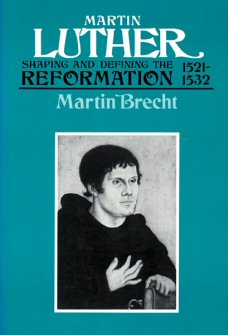
Brecht here describes the years in which the distinctive aspects of the Reformation took shape. During this time four difficult conflicts—the Peasants' War, the interchange between Luther and Erasmus, debates on the Lord's Supper, and the rise of Anabaptist groups—strengthened the need to fashion new orders for govering the church and the need to develop new patterns for worship and the instruction of youth. Luther the theologian was occupied with problems of politics, economy, law, and education. In addition, his own life was altered by his marriage.
Brecht's is a bold undertaking and a successful one, given the enormity of his task. He thus provides a sure guide into Luther's life and work....The book will serve those who wish to continue their study of Luther and in so doing to confront the sources themselves.
— James M. Kittelson, professor, Ohio State University
Martin Brecht is a leading Luther scholar and professor of Reformation and modern church history at the University of Muenster, Germany.
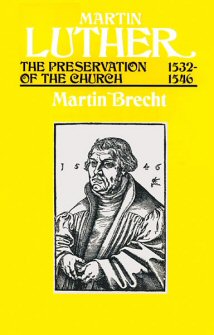
The third volume of Brecht's magnificent biography describes the final fourteen years of Luther's life, beginning with the accession of Elector John Frederick in 1532. The period is often treated briefly because some Reformation developments continued without him, his Catholic opponents paid only partial attention to him, his personality displayed great tensions, and his judgment, errors. Yet the preservation of the church—those confessing the Reformation gospel being identical, according to Luther, with the true church—dominated Luther's concerns.
A work of immense and engaging scholarship, gracefully translated by James Schaaf, this volume offers comprehensive and original interpretations of Luther's private life, his congregation and the church in Saxony, his professorial lectures and theological controversies, Bible translation, Luther and the council of Trent, and his later writings about the Jews and Turks.
The exacting scholarship and balanced judgment of this biography will help ensure its place as the definitive work of its kind well into the next century.
—Denis R. Janz, provost and distinguished professor of the history of Christianity
Martin Brecht is a leading Luther scholar and professor of Reformation and modern church history at the University of Muenster, Germany.
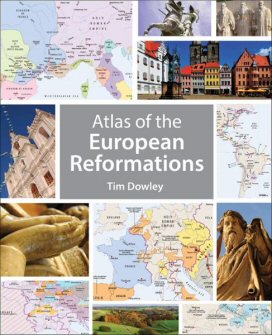
A new, definitive atlas of the European Reformations has been needed for many years. Now, in anticipation of the upcoming reformation anniversaries, Fortress Press is pleased to offer the Atlas of the European Reformations.
The Atlas of the European Reformations is newly built from the ground up. Featuring more than sixty brand new maps, graphics, and timelines, the atlas is a necessary companion to any study of the reformation era. Consciously written for students at any level, concise, helpful texts guide the experience and interpret the visuals. The volume is perfect for independent students, as well as those in structured courses.
The atlas is broken into four primary parts. “Before the Reformation” presents the larger political, religious, and economic context of Europe on the eve of the Reformation. “Reformation” presents the major contours of the Reformation, including Lutheran, Reformed, English, and Anabaptist movements. “Catholic Reform and Counter-Reformation” provides extensive information on the reforming movements within Catholicism and the responses to other movements. Finally, “Early Modern Europe” sheds fresh light on the movement and implications of the reformation in the later sixteenth and seventeenth centuries.
Not only the ‘when’ but also the ‘where’ of past events brings our history into meaningful focus. This volume provides a running overview of the cauldrons of our heritage in the years leading to the Reformation, the sixteenth century itself, and elements of its impact on the seventeenth century, alongside clearly detailed maps. These maps make concrete the spaces in which the epoch-making unfolding of the Reformation took place. Scholars and beginners alike will gain a clearer understanding by placing the places of the Reformation into their geographical and chronological frameworks. A valuable tool for teaching and learning, formal and informal.
—Robert Kolb, professor emeritus, Concordia Seminary
Tim Dowley is author of The Christians: An Illustrated History and The Student Bible Atlas and many other titles on the history of Christianity and the Bible.
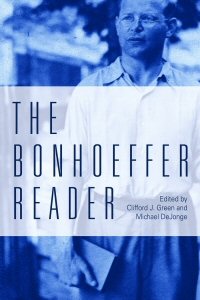
For the first time the essential theological writings of Dietrich Bonhoeffer have been drawn together in a helpful one-volume format. The Bonhoeffer Reader brings the best English translation to students, and provides a ready-made introduction to the thought of this essential thinker.
This outstanding compendium of Bonhoeffer's writings is unmatched in scope and depth. With great classroom potential, it will introduce Bonhoeffer to a new generation for years to come.
—George Hunsinger, professor of theology, Princeton Theological Seminary
Dietrich Bonhoeffer (1906-1945) was a German pastor and theologian whose striking theological journey and public witness against the Nazi regime led to worldwide fame after his death in 1945.
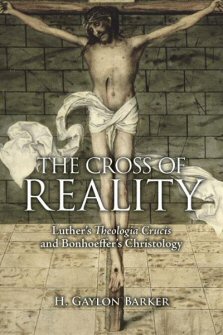
The Cross of Reality investigates Bonhoeffer’s interpretation and use of Luther’s theology in shaping his Christology. In this essay, H. Gaylon Barker uses the “theology of the cross” as a key to understanding the characteristic elements that make up Bonhoeffer’s theology; he also shows how Bonhoeffer’s conversation with his teachers and contemporaries, Karl Holl and Karl Barth in particular, develops. Bonhoeffer’s thought was indeed radical and revolutionary, but it was so precisely because of its adherence to the classical traditions of the church, especially Luther’s theologia crucis. When his theology is understood in light of this tradition, his “nonreligious interpretation,” which he set out to describe in his theological letters from Tegel prison, is not a radical departure from his earlier theology, but is the mature expression of his “theology of the cross.” Bonhoeffer’s Lutheran roots would not allow him to turn his back on the problems and tragedies of the world. In fact, because God had turned toward the world, had entered into the world and identified with suffering individuals, the only proper sphere for theological reflection was this world. Theology properly conceived, therefore, is very this-worldly. It is this worldly character that gives it its power to speak.
No theologian left a deeper imprint on Bonhoeffer than Luther. And no locus of theology permeated his life and thought more profoundly than Luther’s theologia crucis. The beauty of The Cross of Reality is to show its formative power from beginning to middle to end in Bonhoeffer’s consistent turn to the tumultuous reality that engulfed his own life and that of his nation, family, and church. With clarity and nuance Barker shows how the cross looms on every horizon and matters at every turn in Bonhoeffer’s journey. The authority of Bonhoeffer’s truth is rooted here.
—Larry Rasmussen, professor of theology, Union Theological Seminary
H. Gaylon Barker is president of the International Bonhoeffer Society—English language section and served on the editorial board of the Dietrich Bonhoeffer Works English series published by Fortress Press. He also serves as a pastor at St. Andrew’s Lutheran Church, Ridgefield, Connecticut, and is adjunct associate professor of theology and religious studies at Molloy College. He is coeditor of Theological Education at Finkenwalde: 1935-1937: Dietrich Bonhoeffer Works, Volume 14.
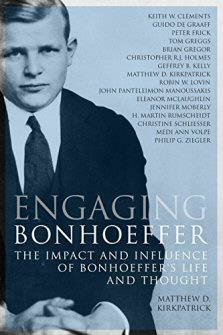
Engaging Bonhoeffer documents the extraordinary impact of Dietrich Bonhoeffer’s life and writing on later thought. Despite his lasting legacy, little substantial scholarship has been conducted in this area. In this magisterial collection, leading international scholars fill this striking gap and critically demonstrate the ways in which Bonhoeffer has been one of the most inspirational writers of the twentieth century. In addition to shedding light on the different trajectories that Bonhoeffer’s work may forge, Engaging Bonhoeffer offers a critical window through which to view the ideas of many leading theological voices.
This volume combines both a selection of excellent scholars and a broad range of themes, to illustrate how different areas Bonhoeffer’s thinking have been influential.
—Christiane Tietz, professor, University of Zurich
Matthew D. Kirkpatrick is lecturer in ethics and Christian doctrine at Wycliffe Hall, University of Oxford. He is author of Søren Kierkegaard, Bonhoeffer’s Ethics: Between Pacifism and Assassination, and Attacks on Christendom in a World Come of Age: Kierkegaard, Bonhoeffer, and the Question of Religionless Christianity.
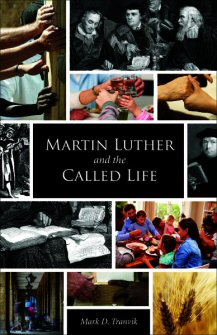
Martin Luther and teh Called Life turns attention to the importance of vocation in Luther’s life and in doing so discovers renewed insights into this important doctrine. Drawing from the rich experience of twenty years of teaching undergraduates, Tranvik balances the historical roots of Luther’s thought and contemporary relevance with skill and vigor.
For years, Mark D. Tranvik has been caught up in two conversations. The first is with college students making decisions about their callings—both occupational as well as those of family life and engagement in society and church. The second is with Martin Luther. Martin Luther and the Called Life brings together Luther's understanding of the baptismally-grounded life within the callings God structures for daily practice of our humanity within the sometimes confusing and discouraging struggles people of all ages encounter in North American society today. Tranvik provides a practical, relevant vision of the life lived by people who trust in Christ and project his love into their worlds, translating Luther's insights for our day and culture with perceptive insight and clarity.
—Robert Kolb, emeritus professor, Concordia Seminary
Mark D. Tranvik is professor of religion at Augsburg College, Minneapolis, where he has taught since 1995. He also directed the college’s Lilly Endowment grant on vocation, Exploring Our Gifts. He has written widely on the Reformation, including the Luther Study Edition translation of The Freedom of a Christian.
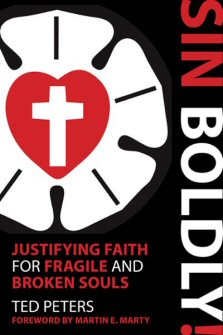
Can faith as trusting God make a difference? Absolutely—by relieving our anxiety over self-justification and the need to scapegoat others. Sin Boldly! provides an experiential analysis of the contrast between self-justification and justification by God. We must pose the question: how can the gospel of grace provide transformation for both fragile and broken souls? This book proposes the following answer: trusting in the God of grace relieves anxiety and provides a divine vocation that transcends our moral universe with the promise of forgiveness, renewal, and resurrection.
This book, Sin Boldly!, written with a sense of humor, is full of theological insight and spiritual wisdom. In its empathetic approach, it speaks to the falsely untroubled soul and to the soul that—or good reasons—eels simply desperate. It brings in the author’s experiences from his life and faith journey and the accompanying voices of many contemporaries. At its very core, it harvests from deep biblical and Reformation insights.
—Michael Welker, professor emeritus, University of Heidelberg
Ted Peters is emeritus professors of systematic theology and ethics at Pacific Lutheran Theological Seminary and the Graduate Theological Union in Berkeley, California. He is author of God—The World’s Future: Systematic Theology for a New Era . He also served on the Human Genome Project and is author of The Stem Cell Debate. He coedited The Gift of Grace: The Future of Lutheran Theology.
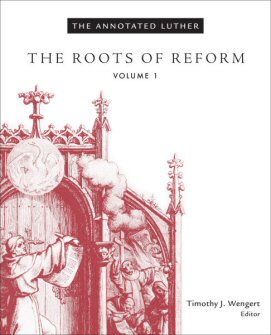
Volume 1 of The Annotated Luther series contains writings that defined the roots of reform set in motion by Martin Luther, beginning with the Ninety-Five Theses (1517) through The Freedom of a Christian (1520). Included are treatises, letters, and sermons written from 1517 to 1520, which set the framework for key themes in all of Luther’s later works. Also included are documents that reveal Luther’s earliest confrontations with Rome and his defense of views and perspectives that led to his excommunication by Leo X in 1520.
These documents display a Luther grounded in late medieval theology and its peculiar issues, trained in the latest humanist methods of the Renaissance, and, most especially, showing sensitivity toward the pastoral consequences of theological positions and church practice.
The Annotated Luther series represents a finely crafted synthesis between readable primary texts and some of the best secondary scholarship. A superb editorial team, under the leadership of Hillerbrand, Stjerna, and Wengert, has made 75 selections, ranging from major treatises to sermons and letters, and beautifully laid these out in six volumes, together with state-of-the-art analyses and explanatory notes. Luther the theologian, the biblical interpreter, the pastor, the social/political thinker—all are given their due, and the resulting multidimensional portrait combines balance with a newly sharpened focus. In sum, a signal achievement.
—Denis R. Janz, distinguished professor of the history of Christianity, Loyola University, New Orleans
Martin Luther (1483–1546), one of the most significant figures in Western history, was the key figure in the Protestant Reformation. Over the course of his life, Luther was a monk, a priest, a professor of biblical literature, a Reformer, a husband, and a father. Luther is most noted for his Ninety-Five Theses (1517), in which he argued that indulgences were not acts of penance which could replace true repentance. His refusal to retract all his writings, demanded by Pope Leo X in 1520 and the Holy Roman Emperor Charles V at the Diet of Worms in 1521, resulted in his excommunication by the pope and condemnation as an outlaw by the emperor. Luther has been both praised and vilified for what he preached and wrote. Luther’s translation of the Christian Bible into the vernacular greatly influenced the church. His works continue to impact all Christians and animate the movement that bears his name.
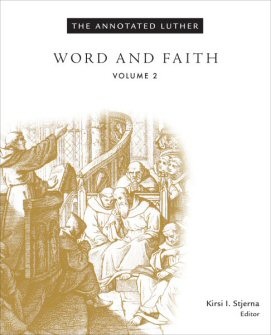
Volume 2 of The Annotated Luther series contains a number of the writings categorized under the theme: word and faith. Luther was particularly focused on what the word “does” in order to create and sustain faith. Writings in the volume range from the large works such as Bondage of the Will, Against the Heavenly Prophets, The Smalcald Articles, and the Large Catechism to Luther’s own Confession of Faith and treatments of Moses, the Gospels, and Two Kinds of Righteousness.
In the treatises in this volume, we hear Luther’s understanding of Scripture and theology as he continues his growth as teaching theologian, pastor, biblical exegete, and apologist for the faith.
Wengert and his colleagues have produced a valuable text for classroom use and personal study. This is an excellent start to what promises to be a fine series.
—Kathryn A. Kleinhans, professor, Wartburg College
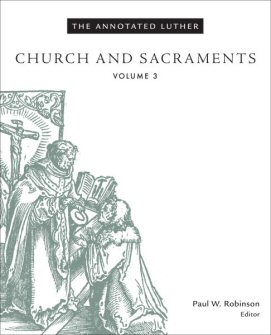
Volume 3 of The Annotated Luther series features Luther's focus on the church and his understanding of the meaning of the sacraments. This volume focuses on Luther's teaching concerning proper understanding and reception of the sacraments, his insights regarding worship, and his understanding of the church.
As congregations and members of congregations face an increasingly more diverse and chaotic world, their struggle for what it means to be Christian in their context increases, not unlike Christians in Luther’s day. I am thrilled that Fortress Press is publishing The Annotated Luther, Volume I: The Roots of Reform. The individual works included in this volume are central to the particular witness Lutherans can share for a life of faith in the world and how it can be a witness of hope in the midst of pluralism and change. The essays and study tools, included alongside the original texts, bring these works to life for us today. I encourage you to include this series in your congregation’s library and use it for group or personal study.
—Gordon J. Straw, program director for Lay Schools for Ministry, Congregational and Synodical Mission Unit, ELCA
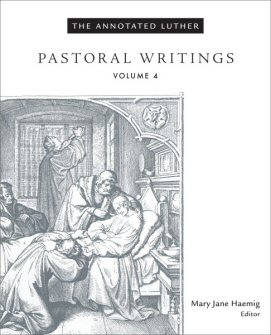
Volume 4 of The Annotated Luther series features Luther's writings on prayer and his more personal insights on human suffering, the Christian life, and death. Faith prepares and gives hope to the followers of Christ who face adversity. This will be heard in selected letters, sermons, hymns, and his popular Small Catechism.
In the introduction, the editor Timothy Wengert again shows why he is one of the premier Reformation scholars of our generation when it comes to communicating the historical significance and pastoral value of Luther's writings. Both he and the other editors of Luther's writings do an outstanding job of providing helpful introductions (beyond a paragraph or two that barely scratches the surface), explanatory annotations, and maps. The layout of the volume deserves special mention for the way that it draws the reader into the text. In brief, this volume will be indispensable to anyone who wishes to understand better the early writings of the reformer, Martin Luther!
—Charles P. Arand, Eugene E. and Nell S. Fincke Graduate Professor of Theology, Concordia Seminary
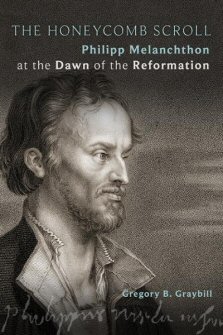
Long overshadowed by Luther and Calvin, Philipp Melanchthon (1497–1560) is one of the most important figures in the Protestant Reformation and had profound effect on Western church history. This book gives the most detailed English-language biographical treatment of Melanchthon to date, moving from his historical context and personal origins, through his childhood, education, and early career at Wittenberg during the dramatic events at the dawn of the Reformation (1497–1524).
Establishing the deep geopolitical and religious context of Melanchthon’s early life, the volume then follows Melanchthon to the great halls of humanist learning at Heidelberg and Tübingen, where his studies and teaching career began and his faith was richly fostered. The pivotal moment comes in his appointment to the chair of Greek in Wittenberg where Melanchthon became a great ally and supporter of Martin Luther.
Melanchthon’s role as key player in the advocacy for reform expanded through his involvement in the Leipzig Disputation, his visible representation of the evangelical cause in Wittenberg during Luther’s absence at Worms and the Wartburg, and his struggle with the radical wing. The volume closes by looking ahead to Melanchthon’s contribution to the Augsburg Confession of 1530.
What would it be like to have been Martin Luther's closest theological companion in the birth years of the Protestant Reformation? Greg Graybill answers this question in his deeply researched post-Oxford-doctoral work written (and illustrated) from Philipp Melanchthon's own personal homes in Germany. Welcome to the heart and mind of the Reformation! I warmly recommend this engaging study.
—Frederick Dale Bruner, George and Lyda Wasson Professor of Religion Emeritus, Whitworth University
Gregory B. Graybill is senior pastor at the First United Presbyterian Church of Moline, Illinois. He earned a DPhil at the University of Oxford and is author of Evangelical Free Will: Philipp Melanchthon’s Doctrinal Journey on the Origins of Faith. He is collaborator on Philippians, Colossians in the Reformation Commentary on Scripture series.